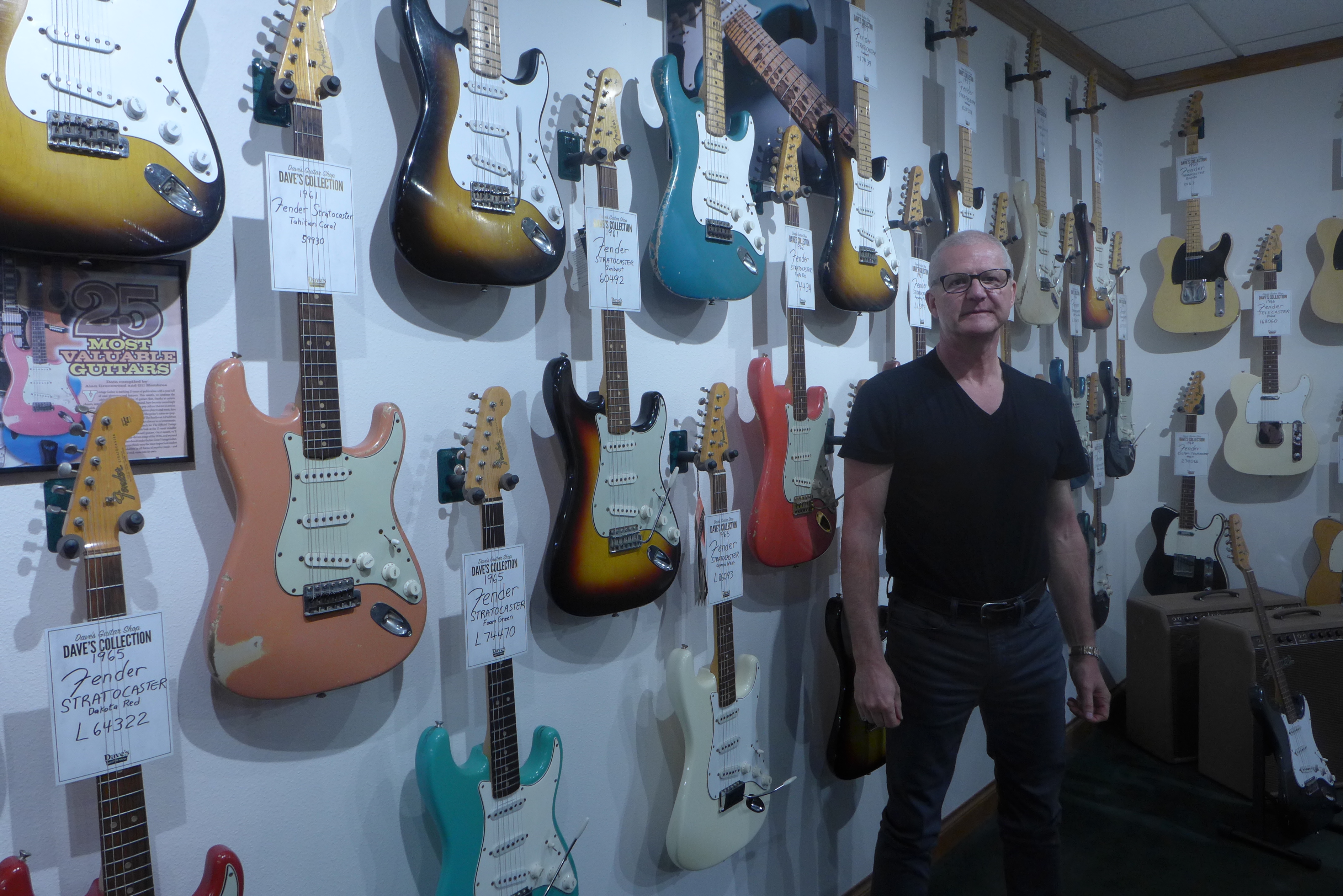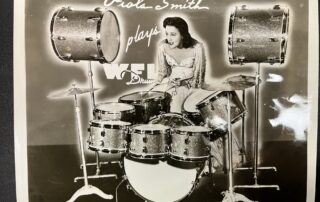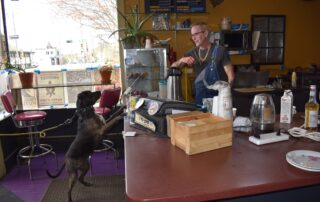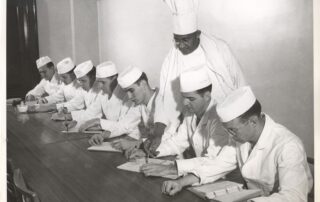When Dave Rogers opened his first guitar store in the early 1980s in downtown La Crosse, it was in a tiny former dental office. He filled it with Fenders and Gibsons.
“I put every guitar that I personally owned, it was about 15 or 16 guitars, out for sale to get things started,” said Rogers. “I played in a band on weekends while living in a small trailer home. I could make enough money on the weekends to support me. Every guitar that sold in the shop, I reinvested in more inventory and kept building it up that way.”
Now, Dave’s Guitar Shop in La Crosse is a major destination. The store sells workhorse guitars and hard-to-find collectibles. People from all over the world purchase guitars and gear from his shop, with 85% of sales coming from outside the La Crosse, Minneapolis, and Chicago areas. The business recently expanded to Milwaukee and Madison.
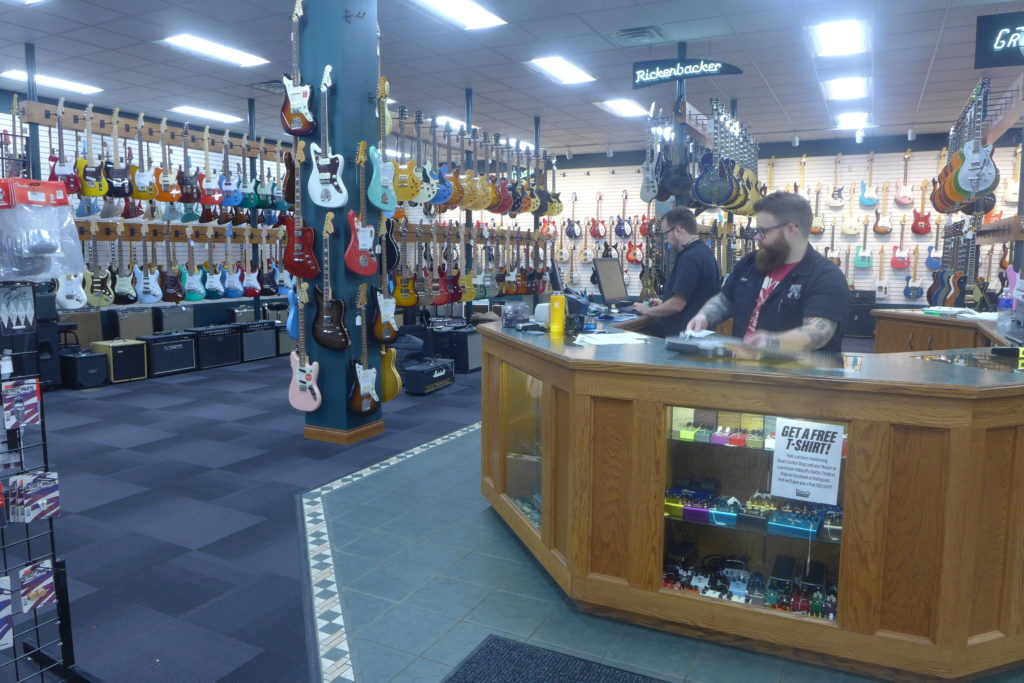
Employees at Dave’s Guitar Shop. (Maureen McCollum/WPR)
Some of his customers are well known in the biz: Eric Clapton, Vince Gill, Bob Dylan, and members of Styx, REO Speedwagon, and Kentucky Headhunters.
“I remember ZZ Top, they played here one time and I got a call at like 11:30 at night, saying they want to get in and get guitars. ‘They’re in a hurry!’ They kept me here until 4 in the morning,” said Rogers laughing.
In fact, the first guitar Rogers ever sold was to guitarist Rick Nielsen of Cheap Trick. It was June 1982, when the band played at the La Crosse Center.
“I took a trunk full of guitars there, made a list, and took it to the sound guy,” said Rogers. “Rick Nielsen was always a guitar hero of mine and he’s a guitar collector. So very inspirational. So next thing you know, I’m backstage with Rick Nielsen. He’s showing me all his guitars. Again, I was opening for the first time the next morning. He kept me out until 2 or 3 in the morning in his hotel. He ended up buying a guitar from me. So he bought the first guitar.”
Rogers used that money to buy a sign for his store.
Nielsen has continued to buy guitars from Rogers over the years.
“He’s been working real hard at it,” said Nielsen. “He’s respected. He’s at all the guitar shows. Everyone knows who he is. He knows what he’s talking about and turned it into a real big business as opposed to another mom and pop dealer.”
Nielsen is not only known as a guitar player, but also as a collector. He owns 400-500 guitars (“It’s ridiculous,” he said. “It’s kind of like an addiction.”). However, that doesn’t stop him from coveting some pieces from Roger’s private collection.
“There was one guitar I wanted to get. I think it was a metallic green Gibson SG. He wouldn’t sell it to me. I’m still a little hurt because of that,” said Nielsen sarcastically.
THE PERSONAL COLLECTION
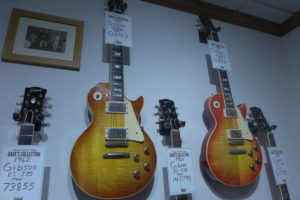
Two 1960 Gibson Les Pauls hang in Dave Rogers’s personal collection at Dave’s Guitar Shop. (Maureen McCollum/WPR)
On the second floor of Dave’s Guitar Shop, Rogers has a personal stash that rivals Nielsen’s collection. There are more than 300 vintage guitars and amps. He has two 1960 Gibson Les Pauls which can sell for about $500,000.
“That’s the most sought after electric solid body that there is, said Rogers. “They only made 1500 of them from 1958-1960. That’s what Eric Clapton played, and Jimmy Page, Duane Allman, Mike Bloomfield. Musicians want to play what their heroes played, so everyone wants an original burst.”
Gibson has reissued the guitars, which Rogers added still sound fantastic.
“If you had a blindfold test. Would I be able to pick out the real one? Probably, but it’s a subtle difference,” said Rogers. “The sound and playability…there’s just such a myth surrounding these guitars. It’s not going to make you a better player, but some people think if they have one they’ll sound like Jimmy Page but that’s not the case.
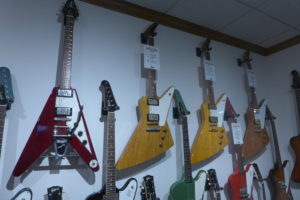
A 1959 Gibson Explorer hangs next to a 1991 reissue in Dave Roger’s personal collection at Dave’s Guitar Shop. (Maureen McCollum/WPR)
Another rarity in the personal collection is a 1959 Gibson Explorer.
“It’s very radical, almost like a lightning bolt guitar,” said Rogers. “It’s very 1980s for me. They did very few of these in the 1950s and it went over horribly. But in the eighties, you saw a resurgence of Flying Vs and Explorers and they were embraced by heavy metal music.”
A 1958 version of the guitar recently sold for $1.1 million.
“Some people you just couldn’t explain it to. They’ll look at this and say ‘It’s a million dollars, are you kidding me??’” said Rogers. “Part of it is market demand. I look at all these guitars and hang it up not only as an instrument, but as a piece of art. I’d rather look at this than any painting. These are truly works of art and Americana. These are things we built when everything was made in America and we were proud of it.”
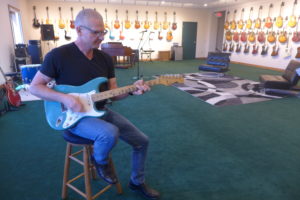
Dave Rogers plays his favorite guitar in his personal collection, a 1957 Fender Stratocaster. (Maureen McCollum/WPR)
Rogers favorite guitar in his collection is a 1957 Fender Stratocaster in Taos Turquoise that he bought in the early eighties.
“I was pretty much broke at the time and this guitar became available at a store in Iowa. It was like $1250 or something. I couldn’t afford to get it, so I told a friend of mine about it. I begged, borrowed, and stole to come up with the money to buy it for a friend. I got it and he didn’t like it. The guitar was super cool, so I kept it. That started the guitar collection, really.”
Today, he has a picture of Eric Clapton holding the Strat next to where the guitar hangs on the wall.
Rogers considers himself a Fender guy. When he’s out and about playing gigs around town with the Dave Rogers Blues Band, he plays a custom black Fender Stratocaster built in 2000.
“I haven’t done a gig without that guitar for 17 years,” said Rogers.
THE FUTURE OF GUITARS
With Gibson’s recent filing for bankruptcy, dozens of think pieces have flooded the internet about the guitar’s lifespan.
To Rogers, this is nothing new. He’s survived the instrument’s ups and downs. When Rogers opened his shop in the early eighties, the synthesizer dominated the music scene. It was a low point for the guitar. Eventually, hair metal and grunge injected the guitar back into the mainstream.
“Right now, the guitar is in kind of a slump,” he said. “If you listen to a lot of pop music, you’re not hearing the guitar like you used to and you don’t have the guitar heroes like we had growing up. But, it’s all cyclical. I think the guitar is going to be around forever.”
Rogers is especially optimistic about the growing bluegrass and roots scene, which boost his acoustic sales.
And when it comes to music stores, Rogers has seen some of his fellow owners retiring or closing down their businesses. Competition from Amazon, Reverb.com, and big box stores creep into their sales, but Rogers shakes that worry off. He has dedicated customers and great employees. He also credits being an early player in online sales in the 1990s and staying ahead of the curve for keeping him in business.
“Finding a guitar is a little more personal to me,” said Rogers. “My favorite is when a guy or gal comes in the store, tries ten guitars, and finds one that just speaks to them. So, I think it’s going to continue. But, the market has changed so drastically in the last 35 years and it changes every year. You just have to roll with the changes. You have to be ready to turn on a dime. I’d like to think a store like ours would survive all this. We have it in place now where guys can take it over when I’m gone. I hope it lasts longer than I do.”
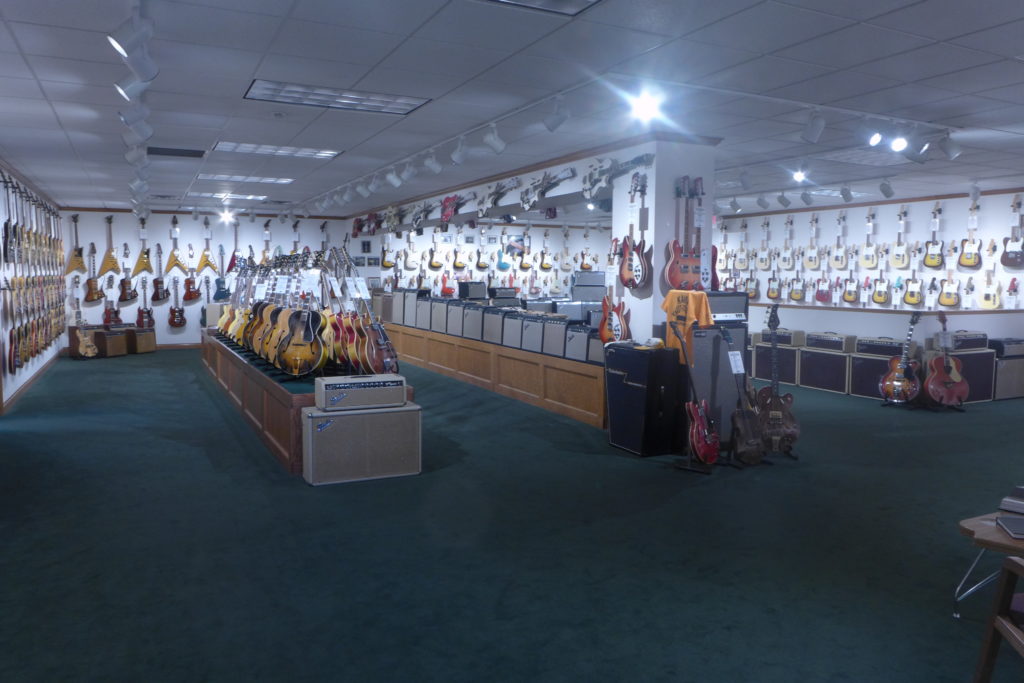
Some of the many guitars in Dave Rogers’ personal collection (Maureen McCollum/WPR)
(This story originally aired on June 22, 2018.)
